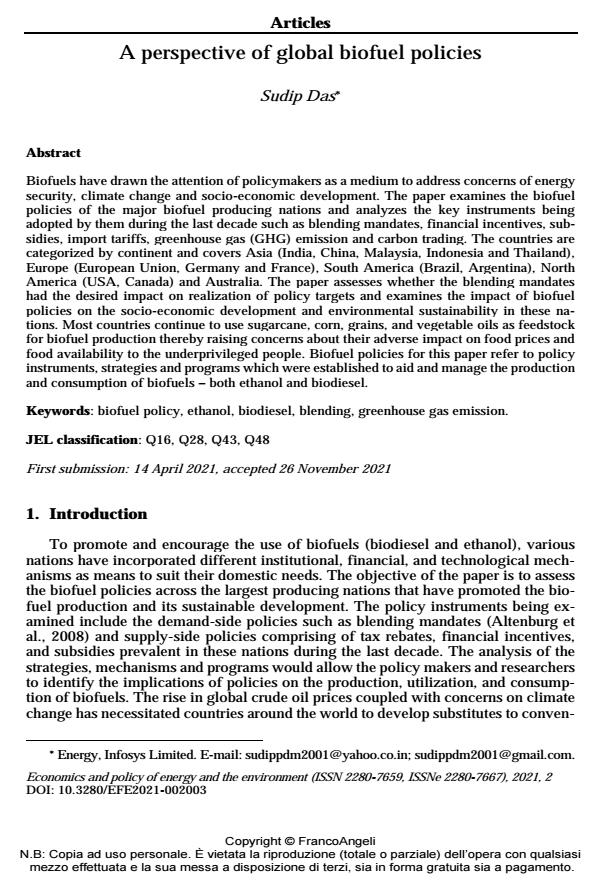A perspective of global biofuel policies
Titolo Rivista ECONOMICS AND POLICY OF ENERGY AND THE ENVIRONMENT
Autori/Curatori Sudip Das
Anno di pubblicazione 2022 Fascicolo 2021/2
Lingua Inglese Numero pagine 31 P. 45-75 Dimensione file 201 KB
DOI 10.3280/EFE2021-002003
Il DOI è il codice a barre della proprietà intellettuale: per saperne di più
clicca qui
Qui sotto puoi vedere in anteprima la prima pagina di questo articolo.
Se questo articolo ti interessa, lo puoi acquistare (e scaricare in formato pdf) seguendo le facili indicazioni per acquistare il download credit. Acquista Download Credits per scaricare questo Articolo in formato PDF

FrancoAngeli è membro della Publishers International Linking Association, Inc (PILA)associazione indipendente e non profit per facilitare (attraverso i servizi tecnologici implementati da CrossRef.org) l’accesso degli studiosi ai contenuti digitali nelle pubblicazioni professionali e scientifiche
Biofuels have drawn the attention of policymakers as a medium to address concerns of energy security, climate change and socio-economic development. The paper examines the biofuel policies of the major biofuel producing nations and analyzes the key instruments being adopted by them during the last decade such as blending mandates, financial incentives, subsidies, import tariffs, greenhouse gas (GHG) emission and carbon trading. The countries are categorized by continent and covers Asia (India, China, Malaysia, Indonesia and Thailand), Europe (European Union, Germany and France), South America (Brazil, Argentina), North America (USA, Canada) and Australia. The paper assesses whether the blending mandates had the desired impact on realization of policy targets and examines the impact of biofuel policies on the socio-economic development and environmental sustainability in these nations. Most countries continue to use sugarcane, corn, grains, and vegetable oils as feedstock for biofuel production thereby raising concerns about their adverse impact on food prices and food availability to the underprivileged people. Biofuel policies for this paper refer to policy instruments, strategies and programs which were established to aid and manage the production and consumption of biofuels - both ethanol and biodiesel.
Keywords:biofuel policy, ethanol, biodiesel, blending, greenhouse gas emission
Jel codes:Q16, Q28, Q43, Q48
- Doumax, V., Philip, J.-M. & Sarasa, C. (2014). Biofuels, tax policies and oil prices in France: Insights from a dynamic CGE model. Energy Policy, 66, 603-614.
- Giuntoli, J. (2018). Advanced biofuel policies in select EU member states: 2018 update.
- Berlin: International Council on Clean Transportation. Joseph, K. (2020). Argentina Biofuels Annual. GAIN Report Number AR2020-0027: USDA Foreign Agricultural Service.
- Kaup, F. & Selbmann, K. (2013). The seesaw of Germany’s biofuel policy – Tracing the evolvement to its current state. Energy Policy, 62, 513-521.
- Kumar, S., Shrestha, P. & Salam, P. A. (2013). A review of biofuel policies in the major biofuel producing countries of ASEAN: Production, targets, policy drivers and impacts. Renewable and Sustainable Energy Reviews, 26, 822-836.
- Langniß, O., Diekmann, J. & Lehr, U. (2009). Advanced mechanisms for the promotion of renewable energy – Models for the future evolution of the German Renewable Energy Act. Energy Policy, 37(4), 1289-1297.
- Mcgrath, C. (2020). China Biofuels Annual. GAIN Report Number CH2020-0105: USDA Foreign Agricultural Service.
- Pohit, S., Biswas, P. K. & Ashra, S. (2014). Incentive structure of India’s biofuel programs: status, shortcomings and implications. Biofuels, 355-369.
- Pohit, S., Biswas, P. K. & Jaya Jha, R. K. (2009). International experiences of ethanol as transport fuel: Policy implications for India. Energy Policy, 37(11), 4540-4548.
- Prasertsri, P. & Chanikornpradit, M. (2020). Thailand Biofuels Annual. GAIN Report Number TH2020-0124: USDA Foreign Agricultural Service.
- Rahmanulloh, A. (2020). Indonesia Biofuels Annual. GAIN Report Number ID2020-0016: USDA Foreign Agricultural Service.
- Roy, D. G. & Klein, K. K. (2012). The Policy Objectives of a Biofuel Industry in Canada: An Assessment. Agriculture, 436-451.
- Sorda, G., Banse, M. & Kemfert, C. (2010). An overview of biofuel policies across the world. Energy Policy, 6977-6988.
- Wahab, A. G. (2019). Malaysia Biofuels Annual. GAIN Report Number MY2019-0009: USDA Foreign Agricultural Service.
- Wolinetz, M. & Hein, M. (2017). Biofuels in Canada 2017. Vancouver: Navius Research.
- Altenburg, T., Dietz, H., Hahl, M., Nikolidakis, N., Rosendahl, C. & Seelige, K. (2008).
- Biodiesel policies for rural development in India. Bonn: German Development Institute, 4.
- Amezaga, J. M., Boyes, S. L. & Harrison, J. A. (2010). Biofuels Policy in the European Union.
- 7th International Biofuels Conference (pp. 1-12). New Delhi.
- Barros, S. (2020). Brazil Biofuels Annual. GAIN Report Number BR2020-0032: USDA Global Agricultural Service.
- Biki, Z. (2020). Australia Biofuels Annual. GAIN Report Number AS2020-0020: USDA Foreign Agricultural Service.
- Biswas, P. K. & Pohit, S. (2012). What ails India’s biodiesel programme?. Energy Policy, 52, 789-796.
- BP (2019). BP Statistical Review of World Energy 2019. London: BP.
- Charles, C., Keller, M. & Moerenhout , T. (2013). Biofuels – At What Cost? A review of costs and benefits of France’s biofuel policies. Manitoba: International Institute for Sustainable Development.
- Danielson, E. (2020). Canada Biofuels Annual. GAIN Report Number CA2020-0070: USDA Foreign Agricultural Service.
- Das, S. (2019). Achievements and misses of the Indian national policy on biofuels 2009. Economics and policy of Energy and the Environment, 2, 5-30.
- Das, S. (2019, October). The Early Bird Catches the Worm – First Mover Advantage through IoT Adoption for Indian Public Sector Retail Oil Outlets. Journal of Global Information Technology Management, 22(4), 280-308.
- Das, S. (2020). The National Policy of biofuels of India – A perspective. Energy Policy, 143, 1-11.
- de Gorter, H., Drabik, D. & Just, D. R. (2011). The Economics of a Blender’s Tax Credit versus a Tax Exemption: The Case of U.S. “Splash and Dash” Biodiesel Exports to the European Union. Applied Economics Perspectives and Policy, 33(4), 510-527.
- Data Analysis of Factors Contributing to the Adoption of Green Hydrogen Sudip Das, in The Journal of Environment & Development /2023 pp.444
DOI: 10.1177/10704965231211588
Sudip Das, A perspective of global biofuel policies in "ECONOMICS AND POLICY OF ENERGY AND THE ENVIRONMENT" 2/2021, pp 45-75, DOI: 10.3280/EFE2021-002003